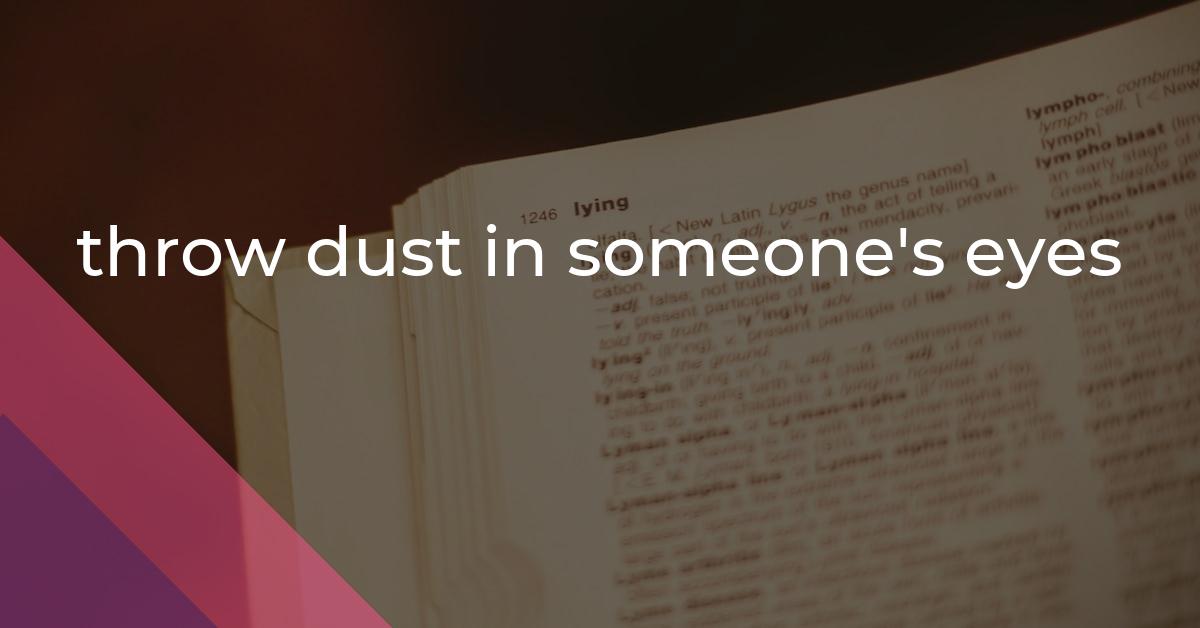throw dust in someone’s eyes: Idiom Meaning and Origin
What does ‘throw dust in someone's eyes’ mean?
The idiom "throw dust in someone's eyes" means to deceive or mislead someone by providing false or misleading information that hides the truth or distracts them from the real issue at hand.

Idiom Explorer
The idiom "wipe someone's eye" means to outdo or surpass someone in a particular area, usually in terms of skill or achievement. It implies a sense of triumph or victory over the other person.
The idiom "throw under the bus" means to betray or sacrifice someone to protect oneself or shift blame onto them.
The idiom "throw to the wolves" means to sacrifice someone to a hostile or merciless group or situation, often for personal gain or to divert attention and avoid responsibility.
The idiom "throw stones in a glass house" means to criticize or attack someone while being vulnerable to the same criticisms or attacks oneself.
The idiom "throw stones" means to criticize or blame someone, often without considering one's own faults or mistakes
The idiom "throw out" means to dispose of something, to get rid of it. It can also mean to eject or expel someone from a place or a group.
The idiom "throw off the trail" means to intentionally mislead or confuse someone who is trying to find or track you, making it difficult for them to follow your actions or whereabouts.
The idiom "throw off balance" means to make someone feel uncertain or confused, disrupting their usual state of composure or stability.
Origins Unveiled
The idiom 'throw dust in someone's eyes' is a figurative expression used to describe the act of deliberately misleading or deceiving someone. The origin and history of this idiom can be traced back to various sources, offering insights into its meaning and usage.
One interpretation suggests that the phrase originated from the tactics used in old Western films. In these films, outlaws would throw dust into the eyes of their pursuers to temporarily blind them and facilitate their escape. This physical act of temporarily impairing someone's vision became associated with the concept of deceiving or distracting someone, leading to the development of the idiomatic expression 'throw dust in someone's eyes'.
Another explanation connects the idiom to the world of magic and illusion. Magicians often employ various techniques to misdirect their audiences' attention and create illusions. 'Throwing dust in someone's eyes' metaphorically implies diverting someone's attention away from what is truly happening, much like a magician diverting attention with a well-timed flourish or distraction.
The idiom can also be understood in a metaphorical sense, suggesting the act of intentionally misleading or deceiving someone by providing false or misleading information. This figurative usage corresponds to the notion of obscuring someone's vision with metaphorical dust, making it difficult for them to perceive the truth.
In contemporary usage, this idiom is commonly applied in both literal and metaphorical contexts. In its literal sense, it can refer to intentional acts of physically obstructing someone's vision, often to allow the perpetrator to escape or gain an advantage. This can be observed in sports where players may use deceptive moves or feints to confuse or disorient their opponents.
Metaphorically, 'throwing dust in someone's eyes' is frequently used to describe acts of deception, misinformation, or distraction aimed at manipulating or misleading others. It can be employed in various situations, such as politics, where deceptive tactics may be employed to influence public opinion or divert attention from controversial issues.
Pulling the wool over someone's eyes is another idiom that shares a similar meaning with 'throwing dust in someone's eyes'. It refers to the act of deceiving or tricking someone, usually by creating a false impression or concealing one's true intentions. This idiom can be used interchangeably with 'throwing dust in someone's eyes' to describe the act of intentionally misleading or deceiving someone.
Similarly, 'throw an eye' is an idiom that has a related meaning to 'throw dust in someone's eyes'. It suggests the act of distracting or diverting someone's attention away from something. Just as 'throwing dust in someone's eyes' involves obscuring someone's vision, 'throwing an eye' involves diverting someone's attention with the intention of misleading or deceiving them.
Peeing in someone's cornflakes is a related idiom that shares a similar meaning with 'throwing dust in someone's eyes'. It refers to the act of deliberately ruining or spoiling someone's enjoyment or happiness. In the context of deception or misleading, 'pee in someone's cornflakes' can be seen as intentionally causing someone discomfort or dissatisfaction by providing false or misleading information.
Similarly, 'pissing in someone's cornflakes' is an idiom that shares a similar meaning with 'throwing dust in someone's eyes'. It implies the act of intentionally ruining or spoiling someone's mood or happiness. In the context of deception or manipulation, 'pissing in someone's cornflakes' can be seen as intentionally causing someone frustration or displeasure by providing false or misleading information.
Overall, the idiom 'throw dust in someone's eyes' encompasses the concept of intentionally misleading or deceiving someone, whether through physical actions, misdirection, or the dissemination of false information. It has evolved from its origins in Western films and magic to become a versatile metaphor used to describe acts of deception in different contexts. This idiom serves as a reminder of human nature's propensity for manipulation and the need to scrutinize information carefully.
Example usage
Examples of how the idiom "throw dust in someone's eyes" can be used in a sentence:
- He tried to throw dust in my eyes by making false promises and diverting my attention from the real issue.
- The politician used clever tactics to throw dust in the voters' eyes, hiding his corrupt practices behind a facade of public service.
- She managed to throw dust in the detective's eyes, leading him astray with misleading clues and false alibis.
More "Deception" idioms



